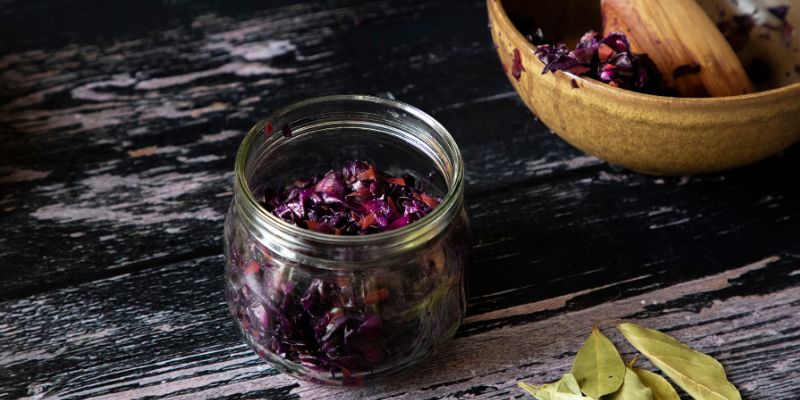Fermentation is when the yeast or bacteria converts the carbohydrates into acid. The process can be natural, as food contains bacteria, or you can create fermented food using starter cultures.
The probiotics or live bacteria in fermented food boosts gut health and diversifies the microbiome. Also, the probiotic improves gastrointestinal mobility, cell growth, and cellular energy.
Fermentation produces some of your favorite foods, but the foods prepared through this process boost your gut health. Continue to read and know more about fermented foods and their health benefits!

How Fermented Foods Boost Digestion for Better Gut Health?
Nowadays, health professionals are paying close attention to naturally fermented foods because they may support the health of your gut microbiome, which is the bacteria that inhabit your intestines. Lactose absorption may be enhanced, your immune system can be strengthened, and lactic acid bacteria can lessen diarrhea symptoms.
An ancient method known as fermentation preserves food, extending its lifespan and nutritional content while providing your body with a healthy amount of probiotics or live microbes essential to a healthy digestive system.

Top Health Benefits Of Fermenting
The health benefits of fermenting are:
Source Of Beneficial Bacteria:
The majority of fermented foods contain microorganisms that may be probiotic. These microorganisms help restore the proper balance of bacteria in your stomach, promoting digestive health. The quantity of bacteria that reach the gut depends on the meal that contains them.
Improve Digestive System:
Fermented foods are quicker to digest because they include natural carbohydrates and sugars broken down by bacteria. It implies that foods like yogurt and cheese can be appropriate for you if you have a problem with lactose.
Improves The Availability Of Nutrients:
Some foods may benefit from fermentation, which can improve their nutritional potential. It entails increasing the production of vitamins and minerals and increasing their availability for absorption by the body. “Anti-nutrients” are eliminated during fermentation, which increases our ability to absorb more beneficial nutrients.
Could Boost Behavior And Mood:
Fermented food improves our mood and behavior. The symptoms of depression and anxiety may be reduced by specific probiotic bacterial strains, such as Lactobacillus and Bifidobacteria, frequently present in fermented foods.
Support Heart Health:
Eating foods that have undergone fermentation as part of a nutritious seems to reduce the risk of heart disease, slight drops in blood pressure, and enhancements in the equilibrium of cholesterol levels.
Boost Your Immune System:
Consuming various fermented foods might boost your immunity and lower your probability of infection. It is still being determined whether eating more fermented foods will have the same benefit.
Helps In Weight Loss:
The helpful bacteria may aid in weight loss and reduce fat.
Top Fermented Foods For Gut Health
Eating fermented foods may help reduce irritation, boost the body’s defenses, and maintain the integrity of the intestinal barrier. It may lower the risk of developing serious illnesses like obesity, irritable bowel syndrome, and inflammatory bowel disease (IBD).
Keep fermented foods away from the fire to avoid eliminating living bacteria. Rather, use them as garnishes for your meals. These are the top fermented foods that you ought to include in your diet.
Kefir
The term kefir means “feeling good”. Kefir is a dairy product and has a yogurt-like flavor. Kefir has a lot of health advantages. Lower lactose is present in kefir than in milk. Kefir can be consumed even by persons who are lactose-sensitive.
Tempeh
A cake-like munch produced from fermented soybeans is called tempeh. Its taste quality is significantly nuttier, and the consistency is harder. Tempeh is full of minerals that have the potential to boost your health and function as antioxidants.
Kombucha
Fermented black tea and sugar, kombucha is frequently flavored with fruit or herbs. While switching to kombucha from soda is beneficial, keep in mind that kombucha also includes sugar. To make it less sweet, combine it with seltzer.
Natto
A common bacterial meal is natto, prepared from fermented soybeans. Vitamin K, a crucial vitamin for healthy bones, is abundant in natto. After fermentation, natto takes on a powerful aroma, rich flavor, and slimy consistency that some people find unpleasant.
Probiotic Yogurt
Another fantastic source of probiotics that are good for the gut is yogurt, which has cultures that are currently growing. If you’re insensitive to lactose, you might still be allowed yogurt since the bacteria in it aid in the digestion of part of the lactose or milk sugar.
Msio
Miso, a fermented soybean, brown rice, or barley sauce, gives food a pleasant, rich taste. Increased miso consumption lowers the risk of stomach ulcers and premature death.
Kimchi
Kimchi is a fermented and salty vegetable dish from Korea. Fish sauce, Korean chili flakes, scallions, garlic, ginger, and napa cabbage are usually used in its preparation. It works well to lessen diabetes and cholesterol.

Sauerkraut
You can use sauerkraut for more than just drizzling over hot dogs. Fermented green or red cabbage is used to make sauerkraut, which has a high fiber content and is an amazing source of calcium, iron, and copper. Although some people find that sauerkraut improves intestinal health, not everybody can take it well.
Raw Cheese
Non-pasteurized milk is used to make cheeses. Probiotic content is especially high in soft cheeses. Check the list of ingredients to discover authentic fermented cheeses. The raw form of the cheese should be declared on the wrapper.
Apple Cider Vinegar
Certain acids, such as acetic acid, are found in apple cider vinegar and assist bacteria and prebiotics in your gut function. To raise your probiotic levels, try consuming more fermented veggies and incorporate one tablespoon of apple cider vinegar into your meal before breakfast and lunch or breakfast and dinner.
Conclusion:
Fermented foods are great for gut health as they are rich sources of probiotics and beneficial bacteria. The probiotics can improve the immunity, improves the digestion, and help in weight loss. Kefir, tempeh, Kombucha, natto, and yogurt are a few of the best-fermented food that improves your hut health and provides various other health benefits.




